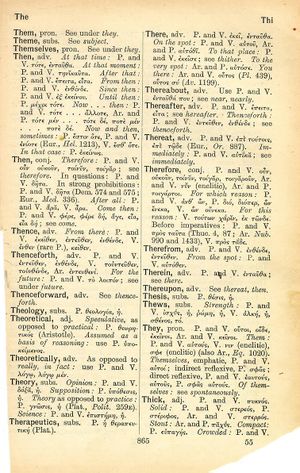thereat: Difference between revisions
From LSJ
καλῶς γέ μου τὸν υἱὸν ὦ Στιλβωνίδη εὑρὼν ἀπιόντ' ἀπὸ γυμνασίου λελουμένον οὐκ ἔκυσας, οὐ προσεῖπας, οὐ προσηγάγου, οὐκ ὠρχιπέδισας, ὢν ἐμοὶ πατρικὸς φίλος → Ah! Is this well done, Stilbonides? You met my son coming from the bath after the gymnasium and you neither spoke to him, nor kissed him, nor took him with you, nor ever once felt his balls. Would anyone call you an old friend of mine?
(CSV5) |
m (Woodhouse1 replacement) |
||
| Line 1: | Line 1: | ||
{{Woodhouse1 | {{Woodhouse1 | ||
|Text=[[File:woodhouse_865.jpg|thumb|link={{filepath:woodhouse_865.jpg}}]] | |Text=[[File:woodhouse_865.jpg|thumb|link={{filepath:woodhouse_865.jpg}}]] | ||
===adverb=== | |||
P. and V. ἐπὶ τούτοις, ἐπὶ τῷδε (Eur., '' | [[prose|P.]] and [[verse|V.]] [[ἐπὶ τούτοις]], [[ἐπὶ τῷδε]] ([[Euripides|Eur.]], ''[[Orestes]]'' 887). | ||
[[immediately]]: [[prose|P.]] and [[verse|V.]] [[αὐτίκα]]; see [[immediately]]. | |||
}} | }} | ||
Revision as of 09:08, 20 May 2020
English > Greek (Woodhouse)
adverb
P. and V. ἐπὶ τούτοις, ἐπὶ τῷδε (Eur., Orestes 887).
immediately: P. and V. αὐτίκα; see immediately.

